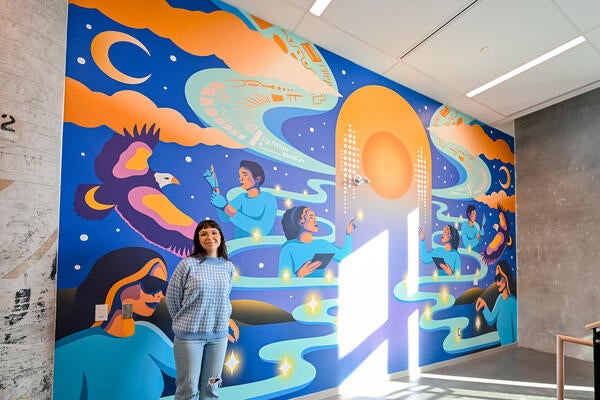
Unstoppable innovation
Velocity companies reflect on starting and scaling their businesses during the COVID-19 pandemic

Velocity companies reflect on starting and scaling their businesses during the COVID-19 pandemic
By Naomi Grosman VelocityWhen COVID-19 restrictions started rolling out in March 2020, workplaces were forced to quickly adapt from in-person operations to virtual.
This meant big changes for Velocity and the companies operating out of the downtown Kitchener and University of Waterloo locations.
Ribbit and 1Mentor are among the 88 companies that have joined Velocity since the start of the pandemic.
Despite ramping up operations amidst pandemic restrictions, their drive to innovate and scale their business remained limitless.
Ribbit’s co-founders Jeremy Wang (PhD ‘22) and Carl Pigeon are both aerospace engineers. While Ribbit is building autonomous airplanes, the company’s purpose lies beyond that horizon.
“We actually started [Ribbit] because we are passionate about addressing issues with food insecurity,” says co-founder and chief operating officer Jeremy Wang.
Ribbit is making autonomous cargo planes to transport food and other necessities to communities and regions with limited or no road access.
The company started working with Velocity in the fall of 2019, during Ribbit’s ideation stage. By April 2020 the company had incorporated and bought its first airplane. Within a year it had raised a pre-seed round and after only 14 months of operation, Ribbit completed Canada’s first hands-free gate-to-gate flight.
Wang says the pandemic did not have a material impact on the business. If anything, it highlighted the pressing need for autonomous cargo planes.
“Our [current] market is Northern Canada — these are 120 or so isolated communities — and when the pandemic hit, the already fragile supply chains were made much worse because planes were not flying in because communities were in lockdown,” Wang says. “Food, medicine, everything stopped and highlighted the need for autonomy and better transportation for these hard-to-reach areas.”
Ribbit operates out of a private airstrip in Burlington, Ontario. It now owns two airplanes and has signed on six leading online retailers whose products Ribbit plans to transport to remote areas in Canada.
Because of the scope of its operations — airplanes and an airstrip being a crucial component to developing its tech — Ribbit has always accessed Velocity's tailored advisory and network remotely, which remained unchanged throughout its time at Velocity, Wang says.
“Most importantly people remain excited — excited to work together and through problems and to continue making great things, regardless of whether you’re in person or spread across the country.”
Prior to the pandemic, Esteban Veintimilla (BMath ‘18, MBET ‘22) was already working on what would become 1Mentor. His focus centred around rigorous data analysis, aiming to unravel the precise skill sets companies sought after, with an eye on bridging the gap between industry demands and students’ abilities.
At the time he was working at the University of Waterloo, advising students in their job search.

“During the pandemic there were many students without jobs because employers were cancelling positions,” Veintimilla says. “[1Mentor] could support even more students get their first work experience by really understanding what employers wanted.”
When one of Veintimilla’s students got a job at a Velocity company, an adviser there encouraged him to apply.
“They said 1Mentor was a game-changer for preparing talent for the future of work and was solving a real problem — and we ended up applying.”
In 2021, during their first year at Velocity, the company partnered with two more universities, Purdue University in Indiana, USA, and the University of Alberta, in addition to its existing partnership with University of Waterloo. It also received its first investment from the Velocity Fund.
Now the company analyzes more than 110 million job descriptions using artificial intelligence. It has closed its first pre-seed round and partnered with two more universities, including Arizona State University and Tecnológico de Monterrey in Mexico.
Veintimilla says that while the pandemic was difficult for many, it didn’t hamper 1Mentor’s business development.
“There was so much uncertainty and during the first lockdown I was in Canada for nine weeks by myself,” Veintimilla says. “It was time to go full force — it helped us focus because there was nothing else to do, and we could just go for it. And (universities) actually expected virtual calls, which allowed us to close more deals.”
Innovators forge ahead and succeed even in the midst of uncertainty, like the COVID-19 pandemic. And Veintimilla suggests it comes from an intrinsic place.
“As entrepreneurs we possess a natural inclination to navigate through uncertainty, constantly seeking silver linings and uncovering opportunities,” he says. "While the pandemic undoubtedly brought about numerous challenges, I remained attuned to the positive aspects that propelled our progress — maybe I’m wired in that way.”

Read more
Ribbit’s pilotless planes are set to make the future of air more inclusive and sustainable

Read more
Many Hearts, One Mind by Indigenous artist Alanah Jewell celebrates the act of creation shared by the Land and innovators in our community

Read more
Here are the people and events behind some of this year’s most compelling Waterloo stories
The University of Waterloo acknowledges that much of our work takes place on the traditional territory of the Neutral, Anishinaabeg, and Haudenosaunee peoples. Our main campus is situated on the Haldimand Tract, the land granted to the Six Nations that includes six miles on each side of the Grand River. Our active work toward reconciliation takes place across our campuses through research, learning, teaching, and community building, and is co-ordinated within the Office of Indigenous Relations.